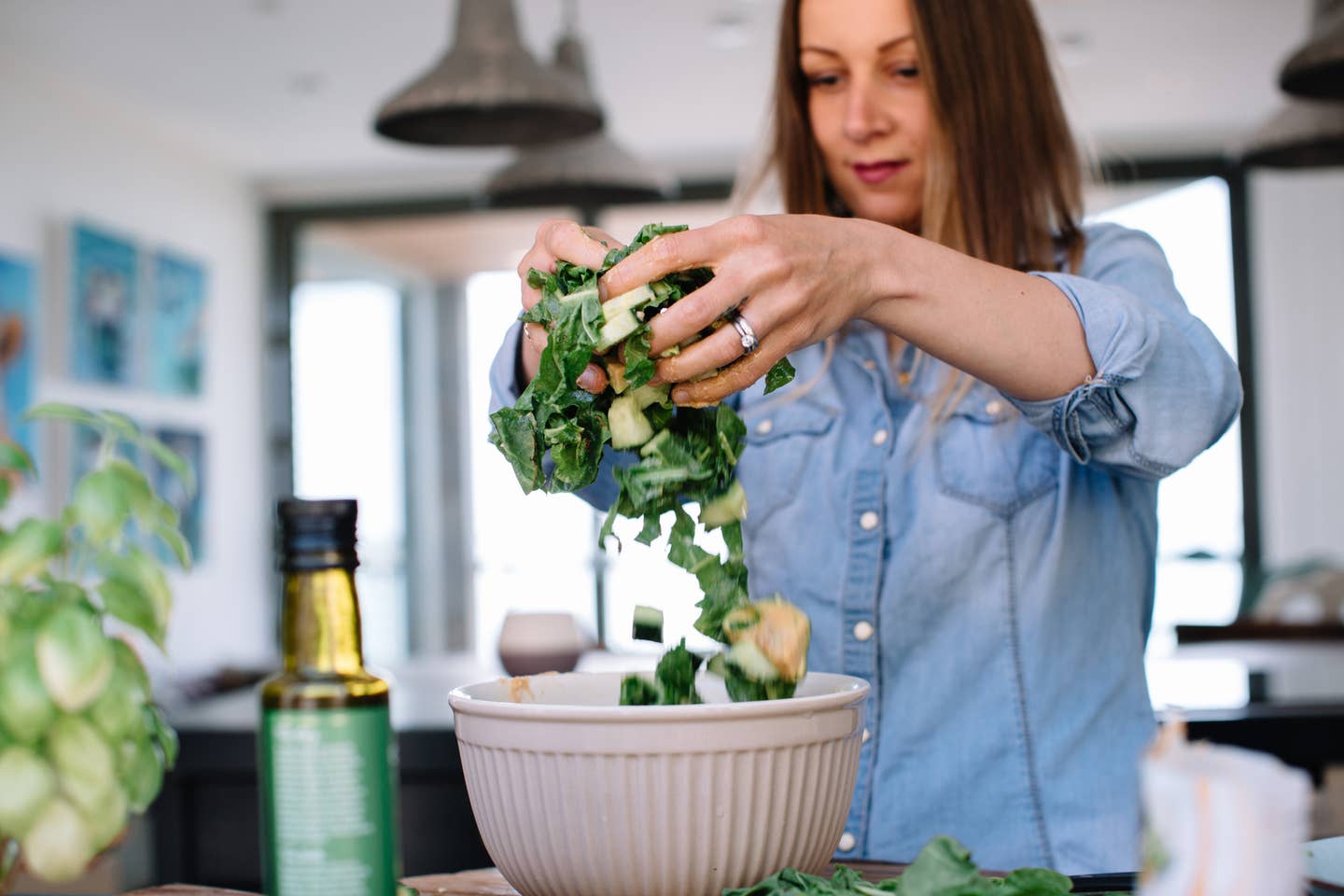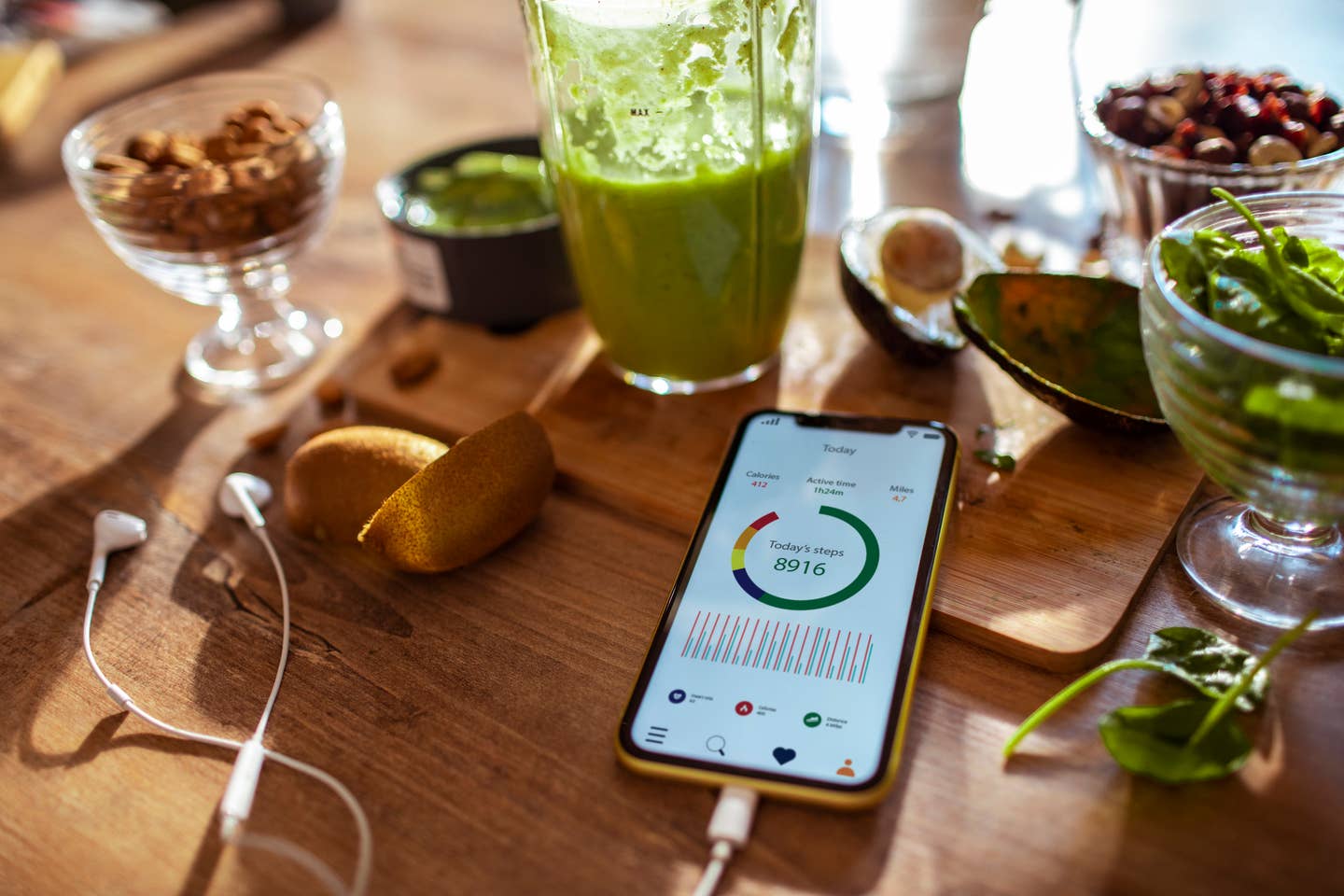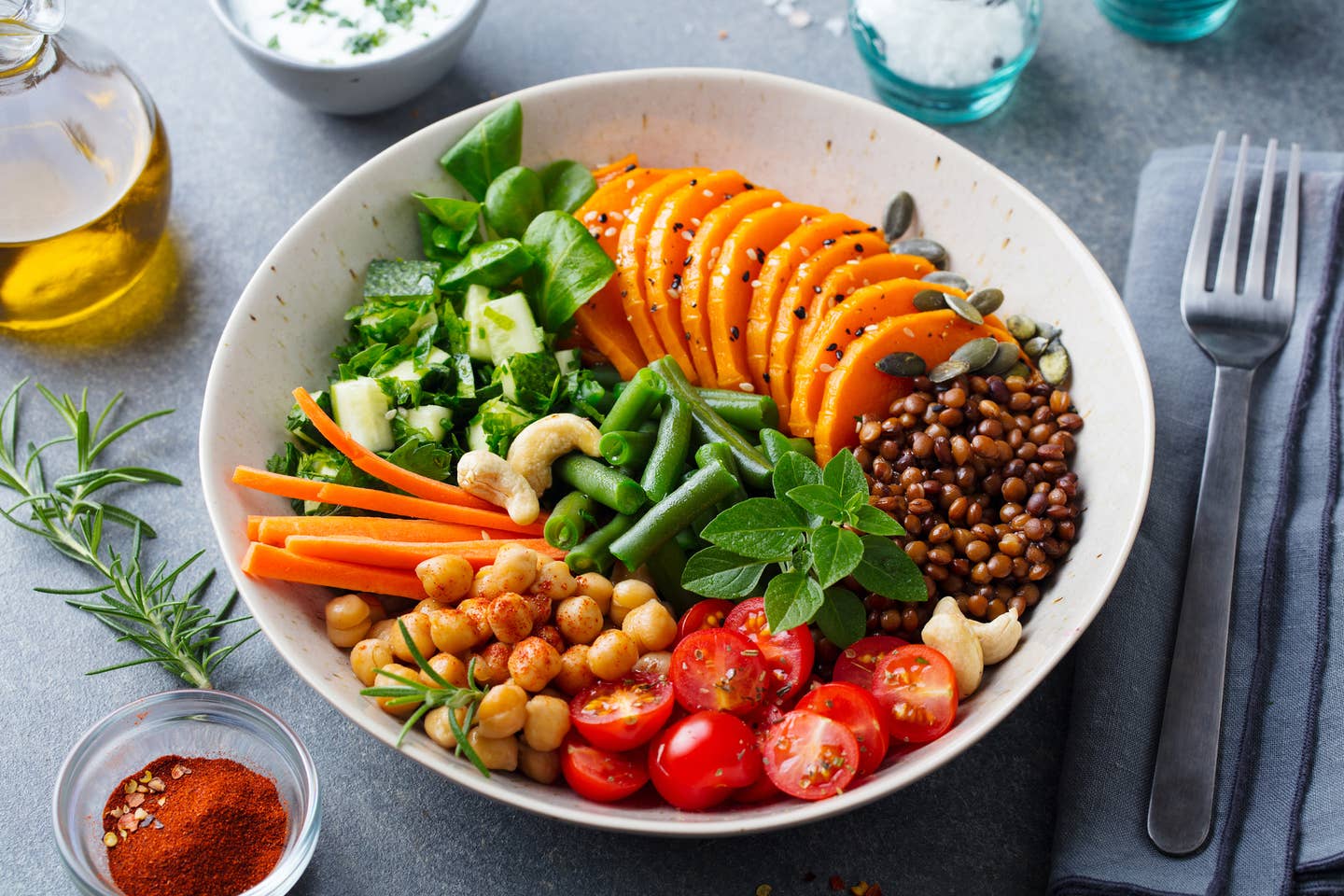
I Tried Intuitive Eating for a Week: Here Are the 3 Things I Learned
Like many people, I try to keep myself on a pretty tight leash when it comes to diet. What that means for me is: Less of the carbs and junk (chips, ice cream, and bread) and more of the protein and vegetables, legumes, and whole grains, nuts, seeds, and fruit. I hate diets and think of them as inhuman (and even contrary to my feminist outlook) and when I recently wanted to shed some pounds this spring, I turned to the method that's gaining in popularity even among die-hard dieters: Intuitive eating.
As RDs will tell you, intuitive eating is defined as eating when hungry, stopping when full, and reaching for foods that your body needs, but not eating just anything or everything in sight. Intuitive eating is about being in tune with your body, not just another excuse for calorie restricting, but rather an actual way of listening to the cues your brain cells, organs, and muscles need to function at their most optimal, and to determine for what you are hungry for and whether or not you need a meal, a snack, a tiny bite, or actually... nothing at all. Sometimes you may in fact be thirsty, not hungry, and when you head to the kitchen for a glass of water you get distracted by the snacks and leftovers you know are there, just behind the cabinet or fridge door.
In one study of intuitive eating, more men than women trusted themselves to listen to their body and stop eating when full, which makes intuitive sense. "Women who reported that they stop eating when they are full had lower odds of reporting chronic dieting and binge eating than those who reported that they do not stop eating when full," the study concluded. They also binge less and maintained a healthy weight. That's what I wanted to achieve.
When you start intuitive eating, you may worry that it will unleash your inner child. That actually happened. I can eat anything? Any time? Bring on the Ben & Jerry's! Well, once you get over that imaginary toddler's voice ruling the inner workings of your brain, you actually come to the quick decision that a pint of Americone Dreams (dairy-free though it may be) is not the answer to what your body wants as fuel. The sugar leaves you logy and feeling sticky inside and out, and when you really want fuel that's high-octane, nothing beats an arugula and baby spinach salad, loaded with fresh peppers, mushrooms, chickpeas, and half an avocado, dressed with home-made vinaigrette and lightly salted. That is what my body began to crave since it left me feeling energized and "clean" fueled like unleaded premium gas in the tank.
“This is not an uncommon outcome when you first start intuitive eating,” comments Registered Dietitian, Lauren Armstrong. “If you’re used to restricting certain foods, you may eat to make up for missing out on those foods all this time. After a while, you’ll likely notice those actions start to dwindle and your mind doesn’t constantly beg you for the ice cream sitting in your freezer.”
All in all, in the week I tried intuitive eating, I only had three "mess-ups," and none of them really felt like they would pack on the pounds because consistency matters when dieting, not the occasional donut or ice cream dive.
What I reached for consistently was healthy plant-based food that left me satisfied and if not full, at least not hungry. In fact in a full week when I ordinarily would have chips every day, I never recall feeling hungry at all, and never pulled out the bag of corn chips I know are lurking above the microwave. I still don't feel hungry or deprived, which is why I am going to continue this exercise for as long as possible, and probably for the rest of my life.
Make Intuitive Dieting Easier: Banish Voices that Lead to Eating, Even Your Own
Three things make intuitive eating easier: One, try to use breathing to calm your mind and body down, to un-link eating from stress. When you slow your breathing you not only create calm in your brain but you trigger the vassal nerve to signal: All is well. No need to stress. There is no Saber-Toothed tiger or other danger lurking, so no need to fuel up or store energy for fight or flight.
By slowing your breathing down, inhaling deeply, and exhaling slowly and deliberately, you calm yourself down, shed the stress like it's water running off you in your morning shower, and allow your brain to stop thinking about the million things all at once. Eating is often a stress response, so get rid of the stress to get rid of the response.
I never used to think of myself as a stress eater so much as a distracted eater. When I wasn't looking (such as when I was engrossed in a phone call or thinking about the million things on my to-do list) my hand would reach into a bag and pull out a small nest of chips and shove it into my mouth. (I remember thinking: Wait, what? I didn't mean to do that!) It was almost as if I were sneaking food behind my own back since my conscious mind wanted to eat healthily and my inner child/ subconscious mind would pile chips into my mouth.
How could this be? I never quite trued it up with my own desire to be healthy. I am a rational, sentient, and mostly focused, and functioning individual. But my snack habits were like a child, out of control and not listening to reason. While I exercise daily and eat healthy food at meals, these in-between moments were sabotaging me. By practicing breathing every few hours and bringing in a new state of relative calmness, my body and brain got into sync and I was not searching for carbs or "sneaking" nibbles all day long.
The second thing and this is a little more complicated, are other people. I am not telling you to get friends and family out of the way, but get them out of your head. Some of my biggest self-sabotaging moments were when I go out with friends or eat out with family. It is as if I am trying to show myself (or others) that I can eat and drink whatever I want. But that's not being an adult, and now, intuitively, I know I want to reign it in, even when I am out.
Still, two to three times eating and drinking more than my body needs, over the course of a week, out of about 20 chances to eat or drink, makes for a mostly healthy week. If consistency is what makes a diet or an exercise regimen, and not the days off, that means you can be mostly healthy most of the time and maintain a consistently healthy weight level, without starving yourself or feeling deprived.
“Social eating can be challenging, but it’s important to still allow it in your routine,” says RD Armstrong. “If you’re constantly skipping out on events with family and friends, it may impact your mental health and lead to emotional eating.”
It helps to listen to your body if you are not the short-order chef feeding hungry little people, spouses, significant others, or anyone else within earshot who asks, "What's for dinner?" In my family, the kids are grown up and living on their own and my husband is out of town for work during the days I tried this new way of eating, so I had the luxury of really, truly being my own boss, diet-wise. (When he has breakfast, now I sit with him and have my coffee since I am never generally hungry until about 11:30 am most mornings.) So I did this experiment when he headed to the airport. Here is how it went:
Day 1. Dinner with a friend, at her house. Vino flowing! We had such fun, talking for hours and topping off our wine that when the night was over I realized I had polished off nearly an entire bottle of rosé and had seconds of the puttanesca sauce. I rarely ever have seconds, but the salty sauce with olives was hitting the spot. The next day I didn't regret the second helping of pasta but the wine stayed in my head in the form of brain fog all morning. I decided that this was the thing I wanted to give up. Dry days ahead! Which would only be awkward because summer is the time of sitting outside with friends and imbibing, especially after a year of social distancing and relative isolation. But Intuitive Eating and Drinking is all about listening to your body, and my body and brain said I would rather feel super sharp the next day.
Day 2. Husband left for the airport so I was on my own, and my luxury is hanging out in the house, working, writing and editing, doing a little gardening as a break, and then after dinner watching a little late-night television that he would never enjoy with me. I had been eating super healthy all day long (red and white bean soup for lunch, salad for dinner) when 9 pm rolled around, I decided to tear open a pint of Americone Dream non-dairy ice cream from Ben & Jerry's that I had bought the week before for a dinner party. I ate the whole pint as if I were a kid left home alone. (I even knew that I could have stopped halfway but decided to just polish it off even though I was already full) But weirdly I did not feel guilty about it. Instead, I just told myself, these things happen, and moved on.
Day 3. No need for breakfast, not hungry yet. Lunch was a large slice of avocado toast and some salad. all good here. Feeling full but healthy. I had a light day of eating and then dinner with a friend where we both ate Brussels sprouts, beet hummus with pita slices, a big salad, and a vegan meal that included a glass of wine, but only one glass.
Day 4-6. Feeling energized and not hungry for junk food. Suddenly I notice that days have gone by and rather than reach for carbs, I listen to my body and make myself whole food lunches and dinners, and the snacking subsides. This was a breakthrough. In fact, I am only interested in eating healthy food, including more salads, bean soups, hummus, avocado, and some fruit (we had watermelon in the house and generally I find it too sweet, especially after a meal, but as a random snack mid-morning, all by itself, it tasted delicious) and occasionally a handful of nuts.
I honestly don't remember everything I ate during the days of Intuitive Eating because unlike my prior state of mind, where I would focus on whether the salad had potato slices in it, making it high on the glycemic index, this time I ate the salad, the potato slices, the green beans, and pretty much whatever I felt like, which meant healthy whole foods that are plant-based, minimally cooked, and fresh. And satisfying! I enjoyed the feeling I had when I was eating this way, instead of being on a blood-sugar rollercoaster of highs and lows, and suddenly I was not tired or lacking focus. My brain was enjoying this experiment as much as my body.
I didn't actually want "bad" stuff like corn chips. I have not reached for a salty chip in days. Instead, I find myself snacking on nuts, especially salty peanuts, and a few big pretzel halves. The thing about intuitive eating is you also are intuitively working out and my big workouts are on the weekends when I have time to ride my bike for miles and miles, or run slow and steady and not watch the clock. On these days, I don't worry about calories since I burn off more than I eat, and when it's hot (as it was this past weekend) hunger subsides.
Day 7. Took a long bike ride, did some planting in the garden, and put up the garden fence to keep the deer out of the vegetables for the season, and was fairly exhausted. Still, I was not actually hungry. If left on my own it would have been a long shower and a short dinner of salad and some grains, but I got wrangled into going out for a dinner that I didn't really feel like going to. The service was slow which meant I ate most of my calories in bread before the entrees arrived. Another diet disaster, in the form of two pieces of bread, and by the time the entree came, I was starving and ate about twice more than I knew my body needed. But still, it didn't feel like all this over-eating would "stick" because I was physically tired, but not stressed.
Stress causes you to gain belly fat, so don't stress about food
One note about stress and food. There is scientific evidence that shows when you are stressed, your body produces cortisol (the stress hormone) which signals to your brain to hold onto fat, specifically belly fat, which is helpful when you are in actual peril since it mobilizes quickly to be used in times when your muscles' energy stores are tapped and you need to flee. But that stress hormone is more dangerous to your health than any sweet treat you might reach for. When you get rid of the stress (through breathing, walking, or any other way) you get rid of the desire for those simple carbs and begin to eat healthier.
A recent Yale study found even lean or slender women who experience stress produce cortisol that contributes to gaining belly fat. “We also found that women with greater abdominal fat had more negative moods and higher levels of life stress,” said Elissa S. Epel, Ph.D., lead investigator on the study she conducted while at Yale's psychology department. “Greater exposure to life stress or psychological vulnerability to stress may explain their enhanced cortisol reactivity.
To get rid of belly fat, first, get rid of stress, then get rid of junk food
"Cortisol affects fat distribution by causing fat to be stored centrally–around the organs," she continued. "Cortisol exposure can increase visceral fat-the fat surrounding the organ–in animals. People with diseases associated with extreme exposure to cortisol, such as severe recurrent depression and Cushing’s disease also have excessive amounts of visceral fat."
So for me, that means, don't stress about eating, even eating carbs, and the calories themselves won't end up "sticking" to your belly, as much as they will likely get burned off with regular exercise. When you do decide to treat yourself, the extra calories seem to slip right through the usual net and you feel as if it's no big deal. Intuitive eating and listening to your body is so simple, as long as you keep salad around as well as vegetables, chickpeas, and beans (and other legumes) as well as whole grains, seeds, nuts, and fruit.
The 3 Surprising things I learned from Intuitive Eating
1. Stop stressing about food.
If you eat a pint of ice cream, have a second plate of pasta, or drink too much wine, let it go. Stress makes you hold onto fat just as readily as if you tucked it into your jeans. Let it go and it will let go of you!
2. Breathe to calm your brain.
Cortisol is the enemy more than carbs. When you think about the fact that you are trying to stay away from simple carbs to shed fat, tell yourself: Actually I want to stay away from stress to be healthier. Use breathing exercises to help with this. I am reading a book called Breath, by James Nestor, and it is a big help in this.
3. Stop setting yourself up for failure.
I used to wake up and tell myself I was intermittent fasting till 2 p.m. but then would get so hungry by 11 I couldn't even concentrate, and when I ate something I felt like I had "failed." Then all hell broke loose.... Just listen to your body and eat when you're hungry. Full stop.
Bottom Line: Listen to your body, not the stress in your head. Don't get distracted and end up eating when you're not hungry, or when others want to eat. Allow yourself to luxuriate in healthy whole foods your body craves. It's not a diet, but I did lose a few pounds over the course of the week. Intuitive eating (and sleeping and exercising) is a way of life.
Top 10 Sources of Plant-Based Protein According to a Nutritionist
1. Seitan
Protein: 21 grams in ⅓ cup (1 ounce) Seitan isn’t as popular as other proteins, but it should be! Made from wheat gluten, its texture resembles ground meat. It’s often used in pre-made veggie burgers or meatless nuggets. Seitan has a savory taste, like mushrooms or chicken, so it works well in dishes that call for an umami flavor. With a hearty texture, seitan can be the star of practically any vegan main dish. Add it to stir-fries, sandwiches, burritos, burgers, or stews. Like tofu, seitan will take on the flavor of any marinade or sauce.
2. Tempeh
Protein: 16 grams in 3 ounces If you like a protein with a bit of bite, add tempeh to your list. Made from fermented soybeans, tempeh has a slightly nutty flavor and is pressed into a block. Most varieties include some sort of grains, such as barley or millet. Not only is tempeh a plant-based source of protein, but the fermentation process also creates good-for-your-gut probiotics. You can cut tempeh right off the block and use it as the base for a sandwich or pan-fry it with some sauce. Or, crumble, heat, and make it the star of your next taco night.
3. Lentils
Protein: 13 grams in ½ cup cooked Lentils come in multiple varieties--red, yellow, green, brown, black. Regardless of the type lentils are small but mighty nutritional powerhouses. They pack a good amount of protein as well as iron, folate, and fiber. When cooked, brown lentils retain their texture and can be the base for a grain bowl or make a hearty substitute for ground meat in meatballs, lasagna, tacos or Bolognese. Red lentils are a bit softer and make a nice add-in for a hearty soup, chili, or stew.
4. Hemp Seeds
Protein: 10 grams in 3 tablespoons Hemp seeds are a tender and nutty seed, derived from the hemp plant. They contain good amounts of omega-3s, iron, folate, magnesium, phosphorus, and manganese. They are also a solid source of both soluble and insoluble fiber, which helps to keep your digestive tract healthy and humming. Because they pack a double whammy of protein and healthy fats, hemp seeds can help satisfy hunger, preventing those embarrassing stomach growls as you slog your way to your lunch break. Add them to your morning smoothie or sprinkle them on top of yogurt, oatmeal, or even a salad.
5. Tofu
Protein: 9 grams in 3 ounces (⅕ of a block) Made from coagulated soybeans, tofu is the most popular plant-based protein. Soy is one of the only meatless "complete" proteins, meaning that it contains all of the essential amino acids that the body can’t make but needs for muscle and immune function. With 15% of your daily calcium needs, tofu is also a good replacement for dairy.
6. Edamame
Protein: 9 grams of protein in ½ cup This sushi appetizer is a nutrient powerhouse, so eat it anytime. Edamame is really just another name for soybeans in their pods. Let’s list off some stats--a small ½-cup serving of edamame has 9 grams of protein, 15% of your daily vitamin C, 10% of your daily iron and 16% of your daily fiber. Keep a bag of edamame in your freezer to serve as a fun-to-eat side dish or opt for the shelled variety to toss into salads or a grain bowl.
7. Quinoa
Protein: 8 grams per cup (cooked) Quinoa is an ancient grain and since it's gluten-free a great choice for anyone avoiding gluten. Add it to your burger recipe to create filling texture, or instead of meat in your taco or burrito. Quinoa is among the healthiest foods on the planet, delivering phytonutrients that have anti-inflammatory qualities, so keep it in your pantry for any meal that needs a filling grain. Just remember to soak it and rinse before cooking to get rid of any bitter taste.
8. Black Beans
Protein: 7 grams in ½ cup (canned) Eating beans on the regular might as well be a prerequisite for a plant-based diet. Not only are canned black beans inexpensive, but they also contribute 10% of your daily iron and 25% of your daily fiber to your diet. For less than $1 a can, beans can be the star of tacos, quesadillas, salads, soups, burgers, or dips.
9. Amaranth
Protein: 6 grams in ⅔ cup (cooked) Chances are you’ve never cooked amaranth. But you should, since this tiny, gluten- free grain is packed with almost 30% of your daily fiber and 20% of your daily iron. Cook it like a traditional grain to yield a soft, porridge-like texture. Many people add amaranth to other a hot breakfast cereal mixture, like oats and quinoa. It also pops like popcorn. Toss it in a pot with some oil and wait for it to pop up into a nutritious snack.
10. Peas
Protein: 5 grams in ⅔ cup If peas were one of your most hated veggies as a kid, it’s time to give them another chance. These green beans are a great low-calorie protein to keep in your freezer. Sure, they don’t always taste great when steamed or microwaved (who wants to eat mushy, overcooked peas?), but they do blend well into a yummy puree that can be slathered on toast. To amp up the flavor, add some lemon juice or mint to your mix before you blend.
More From The Beet






